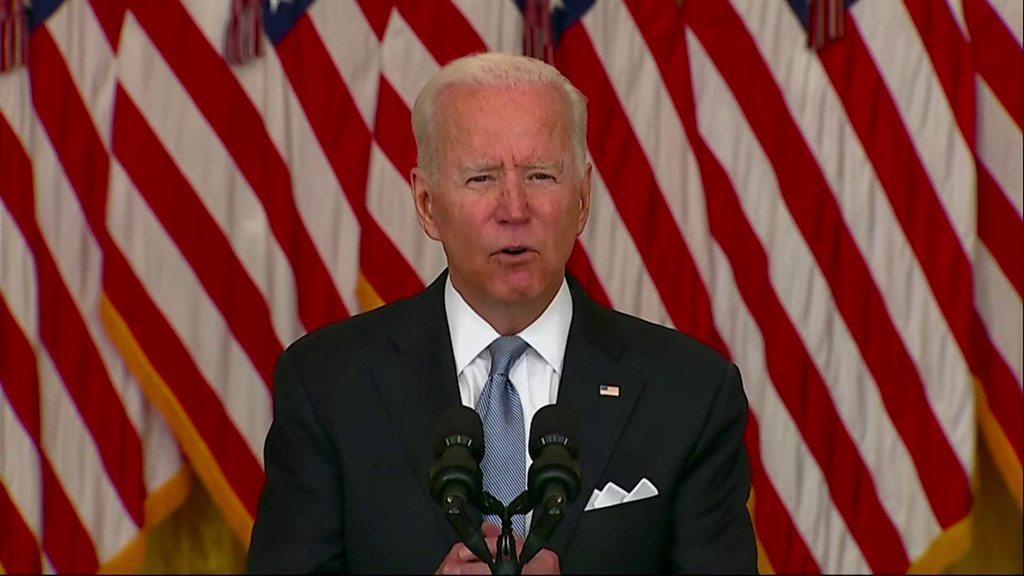Afghanistan: US decision to withdraw lays bare a not so special relationship
- Published
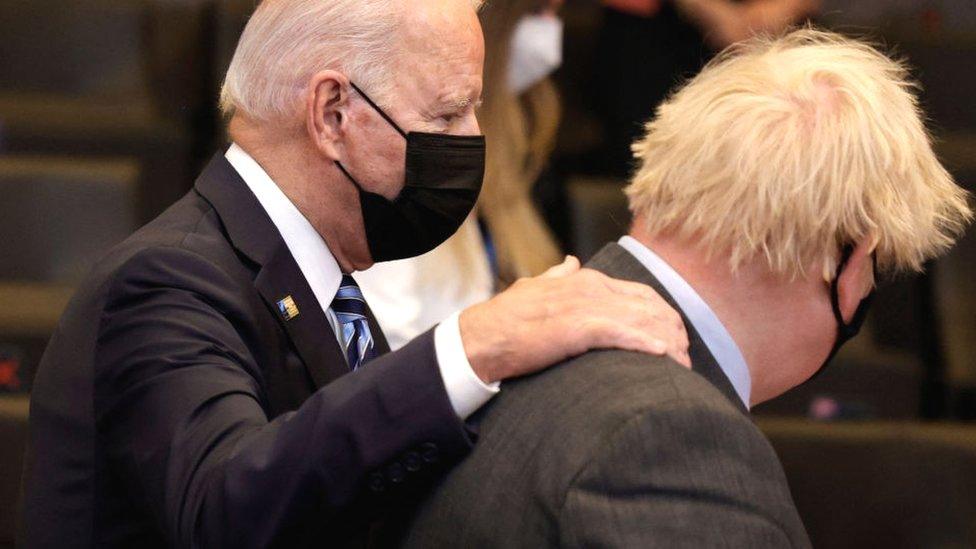
When push comes to shove, the so-called "special relationship" is not so very special
A couple of evenings ago with Afghanistan unravelling into chaos, I was thinking about a piece I want to do to mark the 20th anniversary of 9/11. And so I went on a trip down memory lane and listened back to George W Bush's joint address to Congress following those attacks on American soil (don't tell me I don't know how to have fun).
One particular member of the audience was singled out for huge praise and even greater applause at this sombre moment in US history - and that person was the then-British Prime Minister Tony Blair. Mr Blair was - is - a great believer in the special relationship.
Often, he is criticised for being too slavish in the importance he attaches to it. He was deft (or supine, depending on your viewpoint) in moving from his warm embrace of liberal Bill Clinton to Christian conservative, George W Bush. And too acquiescent (or pusillanimous, depending on your viewpoint) in going along with American ventures, notably the invasion of Iraq.
Even after he had left office, when Barack Obama and then Donald Trump were in the White House, if Mr Blair had criticism to deliver, it would be layered in so much code you would need the World War Two geniuses of Bletchley Park to decipher it.
So I nearly choked on my Sunday morning granola bowl when I saw that he had used the word "imbecilic" to describe the justification for Joe Biden's Afghanistan policy. He didn't actually call the US president an imbecile, but someone as media cute as Mr Blair would have known it would be written up as though he had. And sure enough the headlines were: "Blair calls Biden imbecilic."
Former British PM Tony Blair: 'It's not just about the Afghan people... it's about our security'
Of course, he stopped being prime minister 14 years ago, and so can say whatever he likes. But you can be sure that if he had been prime minister he would never have dared go into public prints with such a verdict. Not a chance. That's not how the special relationship works. But I bet that is what Boris Johnson would love to be able to say. Indeed, there are reports circulating - strongly denied by Downing Street (of course) - that that is pretty much what he has said about Mr Biden's handling of this shocking US-made Afghan crisis.
There are arguably many reasons to complain about the UK prime minister's handling on any number of issues, and I have read from a distance of 3,000 miles the brickbats that have been aimed at Boris Johnson over Afghanistan - but frankly, on this one, he never stood much of a chance.
Now this isn't me going soft, or in any way being an apologist for Mr Johnson. But from Washington, where I am writing, it is just a statement of realpolitik. It is a statement of the reality of the "special relationship", which when push comes to shove - and when America is feeling cornered - isn't so very special.
America acted unilaterally over Afghanistan - actually maybe that should be Joe Biden acted unilaterally. The administration was not much interested in what the UK thought. Mr Biden, from what I have been told, was not much interested in the red flags being raised by his intel community and military top brass, or by the warnings delivered from London. He wanted out. The warnings of HM Government - and my understanding is they were made strenuously - fell on deaf, indifferent ears in Washington.
In those circumstances - and let me depersonalise this - what is a British prime minister to do? If the 800lb gorilla is going to leave the room, what is the much smaller primate meant to do? The idea that the British armed forces could have swarmed in to fill the vacuum left by a US withdrawal is unrealistic.
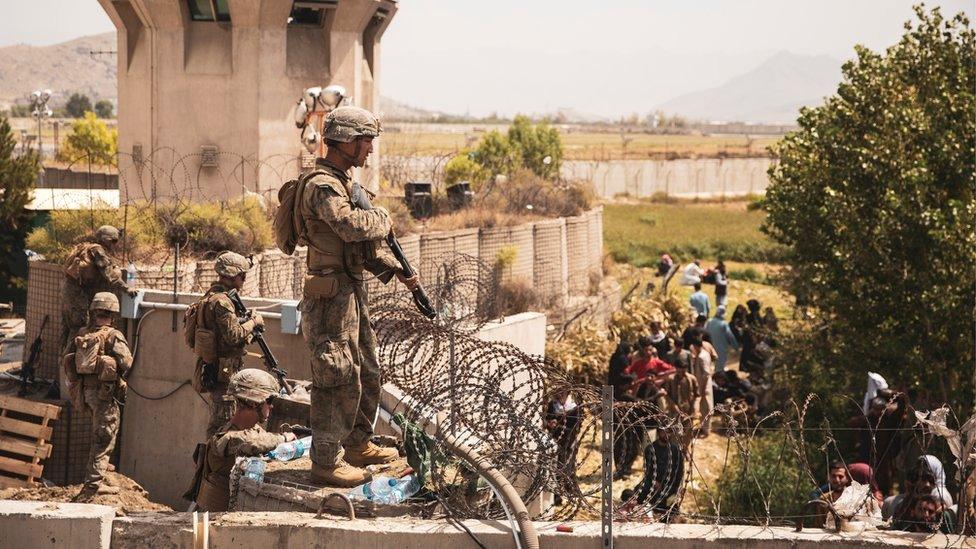
US troops guard a control checkpoint at the perimeter of Kabul airport, Afghanistan
The Ministry of Defence (MoD) with the number of British servicemen and women in situ would have little option but to withdraw - or face heavy casualties that would have in all probability failed to stem the Taliban advance. In American football terms, the US had called the play; there was little for the British to do but fall into line.
And as I say, this isn't about the current incumbent of Downing Street, it's about any occupant of that famous address. Isn't it just a bit hubristic, vainglorious, to think that a British prime minister is going to stop a determined American president in his tracks? What was Boris Johnson meant to say? "I'm sorry Joe, I simply refuse to let you do this."
It has also been suggested in some sections of the British press that this would never have happened during the supposed acme of the "special relationship" when Ronald Reagan was in the White House and Margaret Thatcher was at Number 10. Are you kidding me? Does anyone remember what happened in the Caribbean island of Grenada, in 1983?
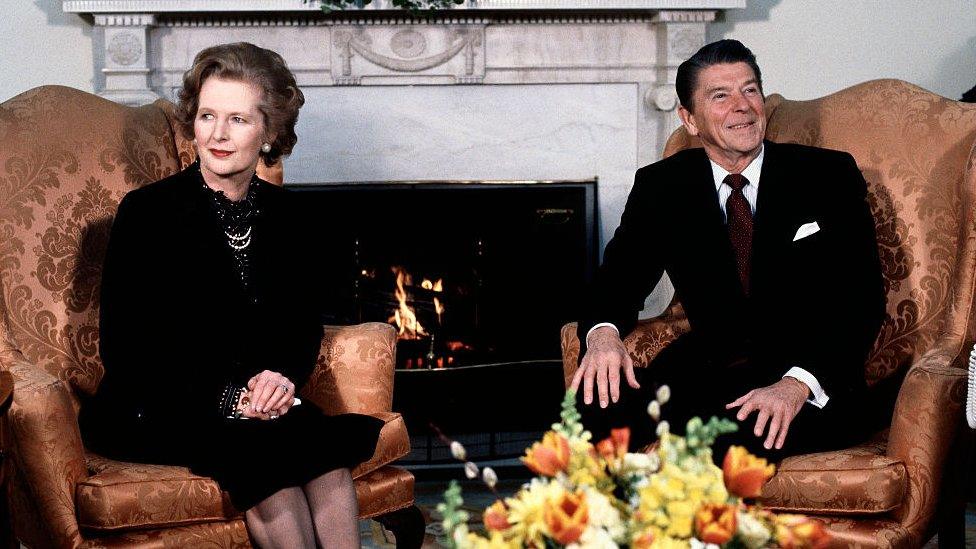
US President Ronald Reagan with UK Prime Minister Margaret Thatcher in 1981
Then, the Cold War was at its height, the "domino theory" was still in place, and in America's backyard - there'd been a bit of a coup. Marxist plotters had captured and killed the prime minister. This required a response and the full force of US military might was unleashed in Operation Urgent Fury.
In Downing Street there was also urgent fury, and it was coming from Mrs Thatcher, ready to give a hand-bagging to anyone who got in her way. Ronald Reagan had not bothered to give her any kind of warning, even though Grenada was a Commonwealth country. It was humiliating for Britain and the Crown, and it gave the Labour opposition a field day. And the Americans were not much bothered.
It brought the memorable dig from the shadow Foreign Secretary, Denis Healey, in the Commons to Sir Geoffrey Howe (then the foreign secretary): "When America says jump, he says 'How high?'" The reality is that there is a deeper truth to that jibe.
Britain can be a restraining force, a moderating force, but rather like the complex constitutional relationship between the - elected - House of Commons and the - unelected - House of Lords, it is probably for the best to understand the junior partner power relationship between the mighty United States, and the far less mighty British.
And since World War Two there are endless examples: the Lend-Lease Act of 1941 skewed massively in America's favour when Churchill (and Britain) paid a heavy price for buying clapped out US warships; the Suez crisis, when the US - in effect - threatened to bankrupt Britain if it carried on with the military adventure with France and Israel in Egypt.
I could list countless other examples where America has ridden roughshod over British sensibilities. In the seven years I have been in Washington I have watched it up close - and it doesn't matter whether the president in the White House is Republican or Democrat: how much the British spend on defence as a proportion of GDP, whether we buy technology from Chinese telecommunications firms, what the Trump administration is going to do about Iran - and on and on.
Actually, because I am a saddo (as if you didn't know) and spend too much time reading diplomatic communiqués, I thought it noteworthy in the Downing Street read out of the call between Mr Biden and Mr Johnson last Tuesday evening, there was an implied rebuke of the US president, with a paragraph stressing that the progress of the past 20 years must not be lost. Mild to the point of insipid, I hear you say.
And you are right - not exactly a message from the British that is going to have Washington quaking in its boots. But what is?
- Published23 August 2021
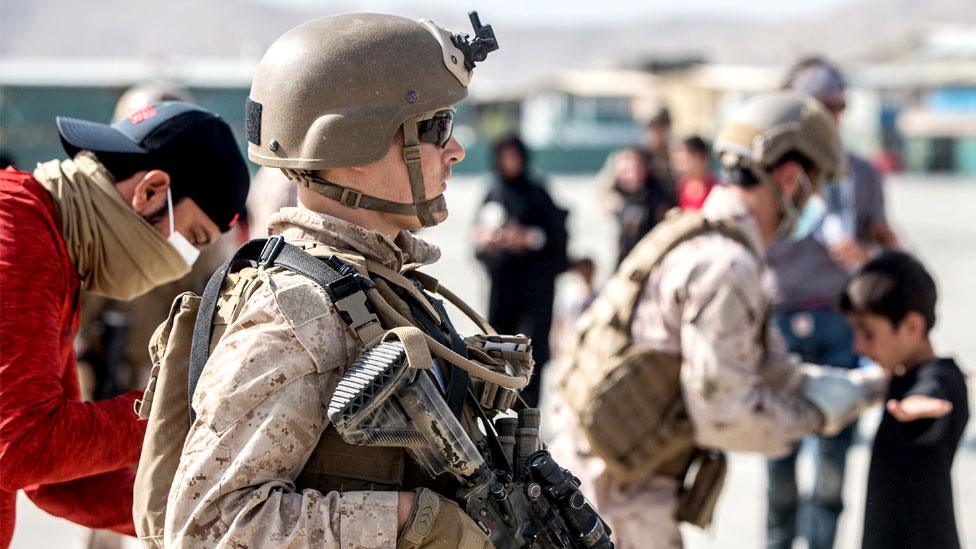
- Published19 August 2021
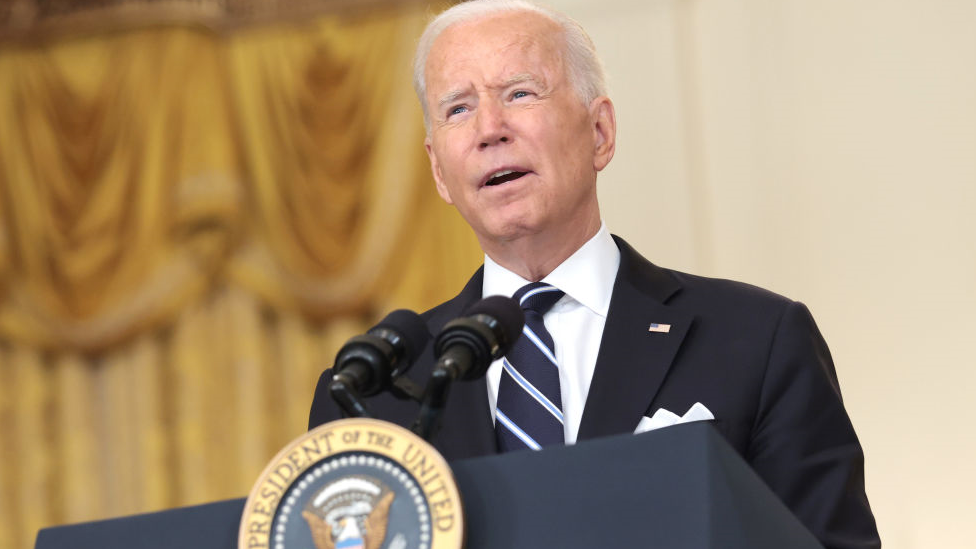
- Published17 August 2021

- Published17 August 2021

- Published16 August 2021
